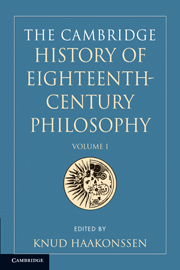Book contents
- Frontmatter
- CONTENTS
- Preface
- Methods of reference and abbreviations
- List of contributors
- I The Concept of Eighteenth-Century Philosophy
- II The Science of Human Nature
- 7 Philosophical Methods
- 8 Human Nature
- 9 Perception and Ideas, Judgement
- 10 Self-Consciousness and Personal Identity
- 11 Reason
- 12 Substances and Modes, Space and Time
- 13 Causality
- 14 Knowledge and Belief
- 15 Scepticism
- 16 Philosophy of Language
- 17 Rhetoric
- 18 Aesthetics
- 19 The Active Powers
- 20 Education
- Biobibliographical Appendix
- Bibliography
- References
9 - Perception and Ideas, Judgement
from II - The Science of Human Nature
Published online by Cambridge University Press: 28 March 2008
- Frontmatter
- CONTENTS
- Preface
- Methods of reference and abbreviations
- List of contributors
- I The Concept of Eighteenth-Century Philosophy
- II The Science of Human Nature
- 7 Philosophical Methods
- 8 Human Nature
- 9 Perception and Ideas, Judgement
- 10 Self-Consciousness and Personal Identity
- 11 Reason
- 12 Substances and Modes, Space and Time
- 13 Causality
- 14 Knowledge and Belief
- 15 Scepticism
- 16 Philosophy of Language
- 17 Rhetoric
- 18 Aesthetics
- 19 The Active Powers
- 20 Education
- Biobibliographical Appendix
- Bibliography
- References
Summary
PERCEPTION AND IDEAS
Perception and understanding: a general introduction
‘The Word “Idea” is one of those that are so clear that they cannot be explained by others, because none is more clear and simple.’ So say Antoine Arnauld and Pierre Nicole, the authors of La logique, ou L’art de penser (1662), better known as the Port-Royal Logic, a seventeenth-century handbook of logic widely used in Europe throughout the eighteenth century. John Locke, whose Essay Concerning Human Understanding (1689) was treated as a ‘logic’ by many of the thinkers who followed in his wake, defined an idea as ‘what so ever is the Object of the Understanding when a Man thinks’, a convenient vehicle, he went on to explain, ‘to express whatever is meant by Phantasm, Notion, Species, or what ever it is, which the Mind can be employ’d about in thinking’ (I.i.8). Locke resisted demands for further clarification. One natural question, raised by some of the first responses to the Essay, is whether ideas are substances (‘thing’-like entities capable of separate existence) or modes (determinate states or aspects of substances). To this, Locke’s reply was ‘let them be what they will. When they are classified as modes or substances,’ he explained, ‘I am no more instructed in their nature, than when I am told they are perceptions, such as I find them’. Yet despite the confidence of Locke and the authors of the Port-Royal Logic, the eighteenth century was riddled with disagreement and confusion about ideas– about their origin and composition, their role in judgement, their relation to the will, their intrinsic nature, and even their very existence.
- Type
- Chapter
- Information
- The Cambridge History of Eighteenth-Century Philosophy , pp. 234 - 285Publisher: Cambridge University PressPrint publication year: 2006



